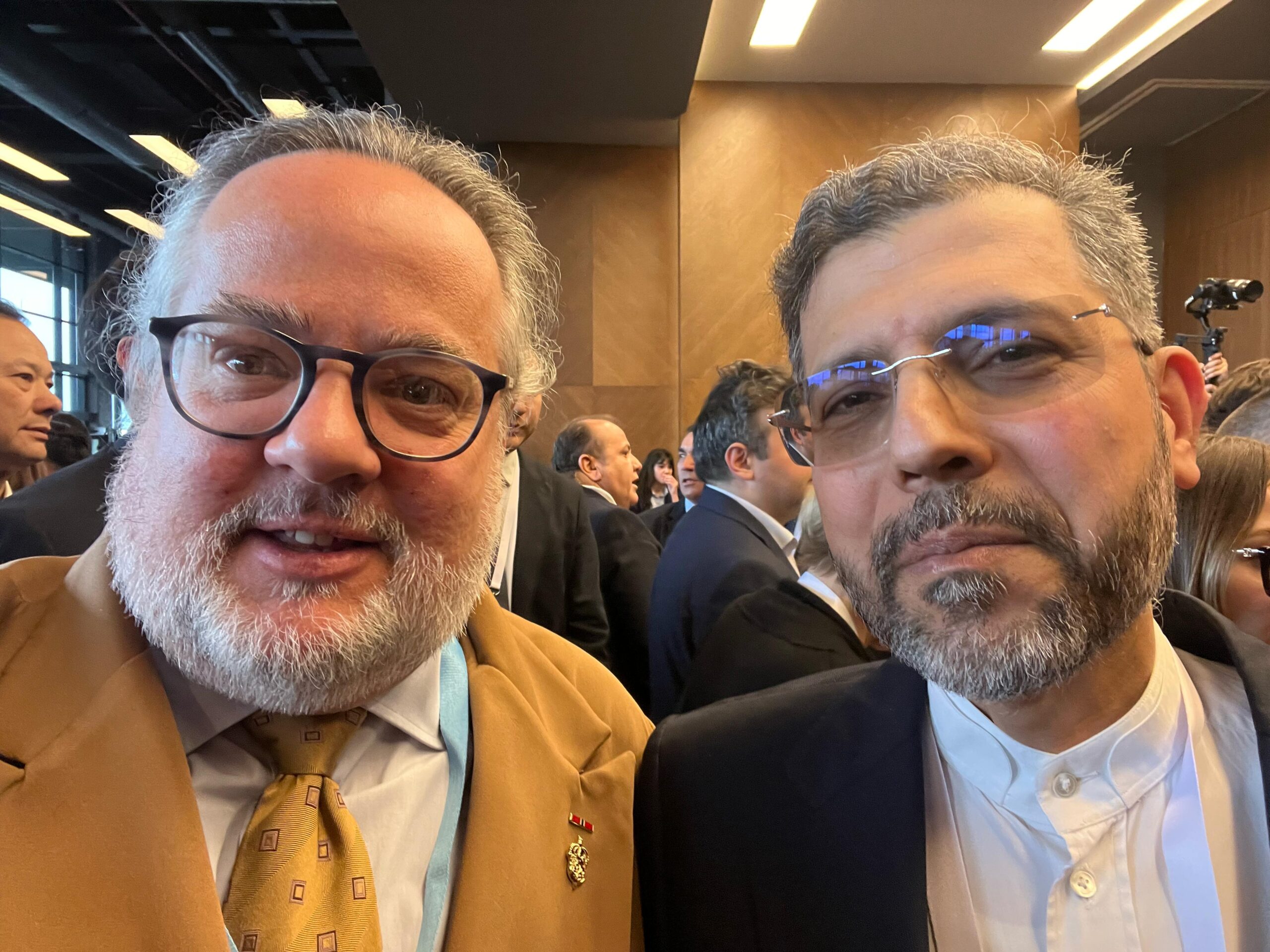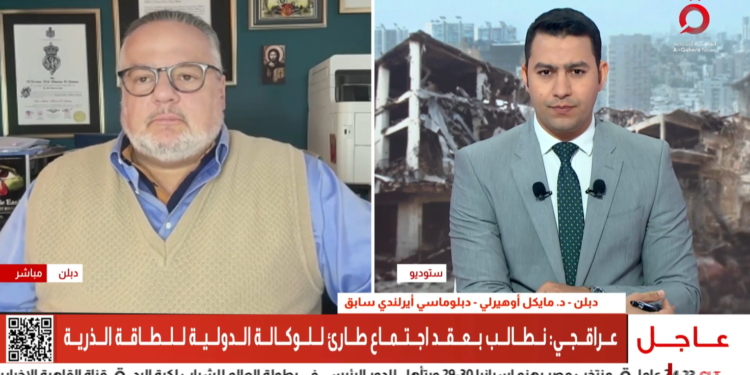by Miceál O’Hurley
GENEVA — If expectations were low for any real progress in Friday’s diplomatic efforts to de-escalate the conflict between Israel and Iraq they must now seem beyond reach. The absence of the bellicose Americans and Israelis in the talks between the United Kingdom, French and German Foreign Ministers ‘Troika’ and Iran’s Foreign Minister should have been a sign an escalation was likely. I said so during my appearance on Al Qahera News Network Friday morning. The unilateral escalation came within 36-hours of my analysis when the US unilaterally escalated the conflict by attacking Iran.

Despite claiming he would take “two weeks” to decide on engaging Iran militarily, leading the Troika to announce a similar period for diplomatic de-escalation efforts, Trump wasted only two days before ordering American B-2 Spirit bombers from Whiteman Air Force Base in Missouri to transit the Atlantic en route to carry-out a coordinate attack on Iranian targets. A fickle leader like Trump was always unlike to pass on an opportunity to engage in a show of strength with relatively little risk. Missing the chance to play the role of the strongman for a man who 3-times shirked military service in the Vietnam War but demanded a $45 million American military parade for his birthday would be wholly anathema to his ego.
According to the United Nations Charter, and under the auspices of customary international law, the use of force against another state is prohibited absent the necessity of self-defense, collective self-defense or otherwise authorised by the UN Security Council. Dropping payloads of high-impact, advanced munitions on 3-sites in Iran using America’s most sophisticated, nuclear capable bombers in the face of the IAEA indicating there is no evidence of a systematic nuclear weapons programme in Iran and without a UN Security Council Resolution authorising military action most likely renders the US attack on Iran unlawful. Trump is no stranger to ignoring the constraints of law.
In a break with precedence and protocol it was not the White House or State Department that announced America had joined Israel as an ally in its war on Iran. Trump seems to have deferred to Netanyahu to claim that distinction. The US will now have to deal with the consequences of having become a military cooperator with Israeli defense forces as a full-fledged participant in its regional activities.
Both Israel and the US are aware their Iranian campaign, conducted concurrently with Israel’s military incursion into Gaza, has had a significant destabilising effect in the region. Tens-of-thousands of Palestinians have been killed or displaced, suffering without adequate housing and access to water, food and medical care. Egypt, Jordan, Iraq and Lebanon are under significant strain to provide for Palestinian refugees caused by Israeli hostilities. The routine transit of Israeli fighters and bombers through sovereign Lebanese and Syrian airspace to strike Gaza and Iran violates international law and weakens the credibility of their already challenged governments.
Battlefield damage assessment and after-action reports will indicate what if any Jordanian, Iraqi or European airspace was used for the latest strikes on Iran by either the US or Israel. What is clear, however, from Cairo to Damascus the political rubble under which regional leaders and governments have been thrown may prove as difficult to overcome as is removing the actual debris from the sites struck by Israel and the US.
The US decision to ally with Israel now blurs all lines of distinction between Israel’s military operations throughout the region and US foreign policy. Israel’s attempts to eliminate Palestinians from Gaza and its campaign against Iran are seen as a singular, regional effort to eliminate opposition to Israel. Hamas, long a beneficiary of Iranian support, immediately took the bait and condemned the attack on Iran. Unsurprisingly, Israel now claims it gives further credence to the necessity of eliminating both Iranian and Palestinian opposition.
Speaking to a press briefing immediately following the US attacks, Netanyahu said, “A short time ago, in full coordination between me and President Trump, and in full operational coordination between the [Israeli army] and the United States military, the United States attacked Iran’s three nuclear facilities: Fordow, Natanz, and Isfahan.” The statement was made shortly after 3:30 a.m. regional time, only hours after Israel’s Shabbat holy day observances ended.
It is of note that one of the three sorties B-2 bombers targeted was Iran’s research facilities at Natanz. Israel claimed they had successfully destroyed the site during their previous strikes. A source inside the US Administration who wished to remain anonymous told me following the attacks, “Trump just shot a corpse in order to claim personal credit for the kill.”
The necessity of America’s early morning strikes on Iran as well as previous strikes by Israel have fallen under intense scrutiny. Israel and America have claimed the strikes were designed to limit Iran’s capacity to achieve nuclear weaponisation through enrichment exceeding levels aligned with domestic energy production. IAEA chief Rafael Grossi refuted the claim telling CNN’s Christine Amanpour, “We did not have any proof of a systematic effort to move into a nuclear weapon.”
Trump’s hand-picked Director of National Security, Tulsi Gabbard, had testified on oath before Congress in March she did not believe there was an eminent nuclear weapons threat from Iran. Only three weeks ago she said, “As we stand here today, closer to the brink of nuclear annihilation than ever before… political elites and warmongers are carelessly fomenting fear and tension between nuclear powers.” Following Israeli protests, Trump rebuked Gabbard. Bowing to her political master after being chastised, Gabbard now claims Iran could have succeeded in creating a nuclear weapon “within weeks.”
Saudi Arabia’s Nuclear and Radiological Regulatory Commission’s post-attack assessment indicates, “No radioactive effects were detected on the environment.” Following Trump’s boast that the US strikes had, “totally obliterated” Iran’s leading nuclear weapons sites, the IAEA posted on ‘X’, “Following attacks on three nuclear sites in Iran… the IAEA can confirm that no increase in off-site radiation levels has been reported as of this time.” Absent findings of any spikes in radiation following the plethora of Israeli and now American attacks on nuclear facilities across Iran the justification for attacking Iran has been rendered untrustworthy.
Few in defense and security circles are surprised. The reliability of US and Israeli intelligence has long been suspect when political motives are at issue. In 2001, the US had claimed with “high confidence” they possessed proof Iraq had acquired “white pancake” and “high strength aluminum tubes and centrifuges” to create weapons of mass destruction. These intelligence-based justifications were invoked to launch preemptive strikes on Iraq which escalated into the Second Gulf War. It is accepted that the “intelligence” was known at the time to have been a fiction used as an apologetic for attempts by the US, UK, Israel and other partners to eliminate Iraqi President Saddam Hussein and enact regime change.
Earlier this week, two highly placed sources in positions of knowledge within the Trump Administration reported Trump recently vetoed an Israeli plan to assassinate Supreme Leader Ayatollah Ali Khamenei. Clearly, Netanyahu desires regime change. Trump’s quip last Tuesday, “We know exactly where the so-called ‘Supreme Leader’ is hiding. He is an easy target, but is safe there – We are not going to take him out, at least not for now,” indicates the US has also contemplated inducing regime change in Iran.
Between Trump’s dangerous rhetoric and the US having become an active belligerent in Israel’s war on Iran, coordinating US air strikes with Tel Aviv and threatening more to come, any hopes for a peaceful resolution have significantly diminished. It is necessary to understand the US’s new orientation in foreign policy implementation. Upon returning to office in January, Trump immediately set about dismantling America’s soft power diplomacy institutions designed to encourage voluntary buy-in to US foreign policy. Without soft diplomacy tools the US has essentially limited itself to a far more confrontational, if not hostile foreign policy orientation. The former Rector of Iran’s School of International Relations and the Diplomatic Academy of Iran, Dr. Masoud Islami, told me once, “To the US government everything looks like a nail because it has nothing in its toolbox but hammers. The extremist and abnormal policy of “maximum pressure” has to stop.” His observation has repeatedly and often been proven true.
In a scene reminiscent of the magician who engages in a slight-of-hand and misdirection to complete his trick, Netanyahu and Trump espouse regime change rhetoric and threats despite trying to distract us with claims of nuclear deterrence. More radiation would have been detected after dropping a smoke alarm than there has been from the multiple attacks on Iran’s supposed nuclear weapons facilities.
Given the scientific information from IAEA that Iran was not systematically pursuing the creation of a nuclear weapon (a conclusion previously shared by the US Director of National Intelligence) accompanied by Saudi Arabia and the IAEA failing to detect radiation following the spate of attacks on sites across Iran, Tehran has undoubtedly assessed correctly that the true Israeli-American goal is the elimination of the Supreme Leader Ayatollah Ali Khamenei and bringing an end to the Islamic Republic.

There is no indication either Israel or the US are interested in offering Tehran an off-ramp that avoids further belligerence. With the failure of the European Troika to use diplomacy to deter Trump or Netanyahu from their chosen path of armed confrontation the situation doesn’t bode well for any peace initiative to be enacted before more violence is inflicted.
Iran cannot help but now resolve that its defense has become an existential matter.
There is little reason to encourage Iran to believe there is any genuine interest in peace. The Troika’s last-minute attempt to broker a de-escalation agreement was a noble effort but one structurally doomed to fail. Neither Israel nor the US were part of those talks. Consequently, without key stakeholders at the table, the talks were never likely to prevent the kind of escalation that took place overnight. In their defense, both Israel and the US claim their hands were tied after Iran refused to treat with them. That neglects the reality both Netanyahu and Trump undertook calculated moves to discourage if not prohibit Iran from engaging directly with them. After all, Trump did call for “unconditional surrender” – a demand which excludes the possibility of dialogue.
By scrutinising the situation it emerges as inescapable that Israel and the US manufactured a casus belli specifically refuted by international inspectors and the consensus of foreign intelligence agencies. The Israeli-American coalition has failed to share compelling, if any, evidence to support their claims of imminent threat. Trump and Netanyahu knowingly created a climate where diplomacy was bound to fail all while asserting the necessity of undertaking a punishing military campaign to make the region safer (it isn’t). Both Trump and Netanyahu conspired to create conditions ripe for war and initiated their plans in 2018 by collaborating to see the US withdraw from the JCPOA then coercing others to do so despite scientific evidence demonstrating Iran was not pursuing nuclear weaponisation.
Tragically, US and Israeli foreign policy made this morning’s attacks inevitable. Trump snatched defeat from the jaws of victory by destroying the JCPOA and creating a climate of hostility while denying real diplomatic solutions a chance to succeed. Though not a perfect solution, the JCPOA was working and would have continued to restrain any attempts by Iran to produce nuclear grade nuclear facilities, if such efforts existed. Critics of the deal claimed it was inadequate but then there are always those who will make ‘the perfect the enemy of the good’. The JCPOA’s robust international inspection programme provided for durability by verification. Iran voluntarily engaged in that process and the EU and world recognised their effort and accepted their bona fides while creating a deterrent verification regime. It was the very verification regime of the JCPOA that posed a direct threat to Netanyahu’s and Trump’s plans to eliminate the Islamic Republic of Iran.
Whatever Israeli-American claims existed or continued concerning Iran’s pursuit of nuclear weaponisation they would have dissipated entirely with proofs arising from repeated inspections of Iran’s nuclear programme under the JCPOA. The truth had to die for the Trump-Netanyahu goal of bringing an end to the Islamic Republic of Iran to come to fruition. This week’s attacks on Iran are genuinely about that. As Winston Churchill once observed, “Truth is the first casualty of war.” It’s as true now as when he spoke it then.
It was only Trump’s and Netanyahu’s refusal to accept the JCPOA’s diplomatic solution with Iran that has brought us to this point. Iran hasn’t always been an easy negotiating partner. Its foreign policy is at best challenging. And yet it has been the continued escalation of belligerent rhetoric and action in the absence of scientific evidence of Iran’s nuclear weapons ambitions that has compelled this armed intervention by Israel and the US. War is what the Trump and Netanyahu wanted and we must all now deal with its uncertain but inescapably dour consequences.
The Levant and the world community are confronted by a Permanent Member of the UN Security Council having violated international law to supposedly maintain “peace.” Where the rule of law applies, we cannot ignore that Trump coordinated his actions with a man wanted for arrest by the Hague for war crimes. There remains no scientific evidence Iran was close to nuclear weaponisation nor any, for that matter, that indicates a systematic programme with weaponisation as its goal. Still, Trump and Netanyahu induced a military intervention where diplomacy had been working.
For regional partners, the threat of destabilisation is now elevated. US attempts over the past 75-years to enact regime change reads like a litany of failure. The CIA’s 1953 Mosaddegh intervention led to the restoration of the Shah which brought about a clericalised Islamic Republic of Iran hostile to Western interests. The Gulf war waged to remove the threat of Saddam Hussein destabilising the Middle East only induced untold violence, conflict and instability thereby actually destabilising the region. The Taliban being removed from power by the US after 9/11 was a fleeting “success” as they returned to power facilitated by the US two decades later. In each of these instances, evolved democratic societies on the periphery were left with little alternative but to initiate repressive measures to maintain stability brought about by US adventurism.
Trump, himself never considered a student of history (or any serious subject), having eliminated seasoned and learned officials who might have at least tried to advise him to consider alternatives to the path he has taken, has reduced the American intellectual “brain-trust” to being a person of one – himself. That prospect haunted American voters last year and yet they were inclined to reelect to the most powerful office in the world a man whose speech patterns are on par with those of an 8-year-old child. With the American electorate behind him and having eliminated all voices of restraint from his inner circle, Trump is free to rely on the advice of officials like the US Ambassador to Israel, Mike Huckabee, who is encouraging Trump to escalate matters by dropping a nuclear device on Iran because he believes it is God’s will?
There are two clear lessons to be learned from this situation. The first is, America never seems to learn from its own mistakes. The second is, when it comes to the Middle East, regional partners are pulled into American and Israeli political fiascos to everyone’s detriment.
Trump’s foreign policy and his entanglement with Netanyahu threatens to bring us all to the proverbial fork-in-the-road scenario as summarised by comedian Woody Allen in his address to a university’s graduating class, “Mankind is facing a crossroad – one road leads to despair and utter hopelessness and the other to total extinction – I sincerely hope you graduates choose the right road.” Regional leaders must assert themselves and deter America from the kind of military adventurism Trump promised to end when running for re-election last year.
















































